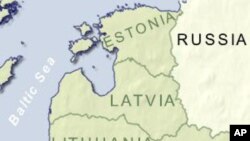Russian authorities are conducting a low-key investigation of discontent in the Baltic enclave of Kaliningrad following Saturday's anti-government rally by thousands of local demonstrators. But the ruling United Russia Party is downplaying the protest as a provocation by the opposition.
Kremlin officials led by Ilya Klebanov, a representative of President Dmitri Medvedev, are in Kaliningrad to discuss the demonstration with local authorities.
On Monday, Klebanov's office confirmed he was in the city but declined to say why. The following day, a leading member of the ruling United Russia Party, Sergei Neverov, told Ekho Moskvy radio station that officials would be meeting with factions in the regional and city parliament, civic organizations, and representatives of various groups to clarify reasons behind the protest.
The number of participants was put between 6,000 people by police and 10,000 by organizers. The Interfax news agency claims even more.
The rally, which apparently caught authorities by surprise, represented a wide range of opposition groups, from communists to nationalists and moderates in between. Their immediate concern was higher transportation taxes, but various social and political demands were also raised, including calls for the resignation of Prime Minister Vladimir Putin.
Authorities in Moscow have rolled back a commuter train tax in the capital, which the Moskovskiy Komsomolets newspaper attributes to fear of a similar protest in the capital.
Opposition leader Boris Nemtsov, who spoke at the rally, told VOA Kaliningrad residents feel trapped because travel from the enclave to Russia proper is expensive, and European visa requirements make visits to the West impossible. He says locals blame Mr. Putin not only for that predicament, but other problems as well.
Nemtsov says they include wild corruption, denying people the right to elect their own governor, and a feeling of complete isolation from the center. He says this mix of grievances brought the opposition together at the demonstration.
United Russia's press service declined VOA's request for comment.
The organization has posted no less than nine messages on its Web site from other top officials referring to the Kaliningrad demonstration. Most dismiss it. They also condemn the opposition for allegedly disinforming, provoking or misleading protesters.
Parliament Member Irina Yarovaya suggests in her message the demonstration was a throwback to the 1990's when, as she puts it, the opposition turned democracy into a curse word. She says there is an impression the opposition's foreign friends have tossed a little money their way to organize a provocation.
Meanwhile, United Russia is denying media reports the organization had planned to hold a counter-demonstration in Kaliningrad this weekend.
The chief editor of Kaliningrad's Dvornik newspaper, Alexei Shabunin, says United Russia simply lacks adequate support in the city and cannot mount a rally without bribing participants or threatening them with work sanctions. Shabunin told VOA Russians are being kept in the dark about the government's handling of the economy.
The editor says Mr. Putin has raised pensions, but asks how will they be financed if there is no economic growth in Russia. He says official predictions of growth do not mean it will be steady, adding that people are clearly losing jobs and pay. Shabunin notes discussion of such problems is prohibited on national television, which only broadcasts what it is told by the president's administration.
Demonstrators also directed their anger at Kaliningrad Governor Georgiy Boos, appointed in 2005 by then President Putin, who had eliminated direct gubernatorial elections. Boos's term expires later this year.
The governor, a member of United Russia, rejects an opposition demand to return the option of voting against all candidates in an election, an option that would not apply to him as governor. The decision to re-appoint him will be made by the Kremlin.
Anti-Government Protest in Kaliningrad Sparks Kremlin Probe

Opposition leader says mix of grievances prompted thousands of local demonstrators to rally; ruling party downplays 'provocation.'



